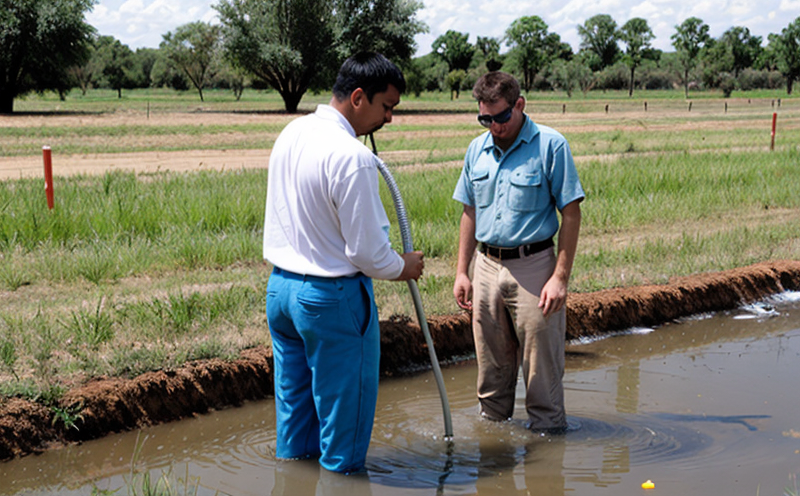ISO 9308-2 Coliform Bacteria Test in Groundwater
The ISO 9308-2 standard provides a method for determining coliform bacteria in drinking water and other potable water sources. While this standard is primarily aimed at potable waters, its principles are equally applicable to groundwater monitoring. In the context of environmental testing, particularly within the sector of Groundwater & Aquifer Monitoring Testing, this test ensures that groundwater meets safe standards for human consumption.
The coliform bacteria test plays a critical role in assessing water quality and is often used as an early indicator of possible contamination. Coliforms are a group of bacteria whose presence indicates that other pathogenic microbes might be present, potentially posing risks to public health. This test is particularly important in regions where groundwater supplies are primary drinking sources.
The testing process involves collecting a water sample from the targeted aquifer or well and transferring it to an appropriate container for analysis. The sample undergoes incubation under specific conditions that promote coliform growth, followed by microscopic examination using chromogenic media that differentiate between coliforms and other bacteria.
Understanding the coliform family is crucial in this context. Coliforms are widely distributed throughout nature and include organisms like Escherichia coli (E. coli), which is particularly significant as it can indicate fecal contamination of water sources, a direct health hazard.
The methodology outlined in ISO 9308-2 ensures that the test results are consistent and comparable worldwide. This standard specifies the use of multiple steps to ensure accuracy: sampling procedures, pre-enrichment methods, incubation conditions, and final identification techniques using chromogenic substrates. These steps guarantee that any detected coliforms can be accurately identified as either total coliforms or fecal coliforms.
Accurate testing is essential for ensuring compliance with local and international water quality regulations. For instance, the U.S. Environmental Protection Agency (EPA) and World Health Organization (WHO) have set standards that require monitoring of coliform bacteria in drinking water supplies. Adhering to ISO 9308-2 ensures that laboratories meet these regulatory requirements.
The reliability of this test is further enhanced by its robustness against false positives, thanks to the chromogenic media used for differentiation. This feature is particularly valuable when conducting multiple tests across various locations or over extended periods. The consistency in testing methodology also makes it easier to compare results from different sources and time points.
In summary, ISO 9308-2 provides a standardized approach that ensures reliable and accurate detection of coliform bacteria in groundwater samples. This standard is indispensable for environmental monitoring programs aimed at safeguarding public health by ensuring the safety of drinking water supplies.
| Industry Applications |
|---|
| The ISO 9308-2 coliform bacteria test is widely used in: |
| - Drinking water treatment facilities to ensure compliance with safety standards. |
| - Groundwater monitoring programs aimed at protecting public health. |
| - Aquifer studies to assess the impact of contaminants on groundwater quality. |
| - Agricultural regions where irrigation is dependent on groundwater sources. |
| - Regulatory agencies conducting inspections and audits to ensure compliance with water quality guidelines. |
Eurolab Advantages
EuroLab, a leading authority in environmental testing, offers the ISO 9308-2 coliform bacteria test as part of its comprehensive suite of services. Our expertise and facilities enable us to provide accurate and reliable results that meet international standards.
- State-of-the-art laboratory equipment ensures precise sample analysis.
- Dedicated staff with extensive experience in environmental testing guarantee consistent quality.
- Comprehensive training programs for our personnel ensure adherence to the latest methodologies, including ISO 9308-2.
- A robust quality management system that complies with international standards, ensuring reliable and reproducible results.
EuroLab's commitment to excellence is reflected in its unwavering pursuit of accuracy and precision. Our services are not only compliant but also exceed industry expectations, providing our clients with the confidence they need for their testing requirements.
Competitive Advantage and Market Impact
- Adherence to ISO standards ensures consistent and reliable results across different regions and laboratories.
- EuroLab's expertise and advanced equipment provide precise and accurate testing, setting us apart in the market.
- Our commitment to quality is recognized by regulatory bodies worldwide, enhancing our reputation among clients.
- The speed and accuracy of our services enable quicker decision-making processes for our clients.
EuroLab's leadership in environmental testing contributes significantly to its competitive position. Our services are sought after by both public and private entities aiming to ensure the safety and quality of their water supplies.





